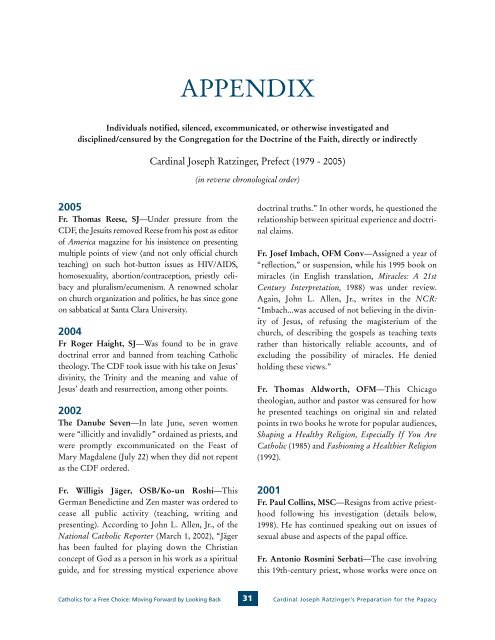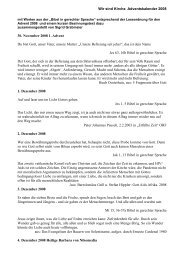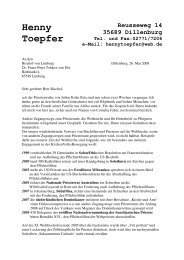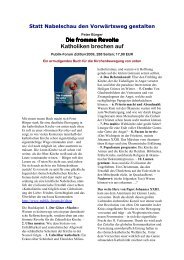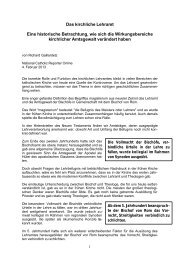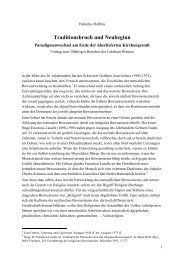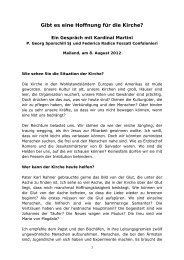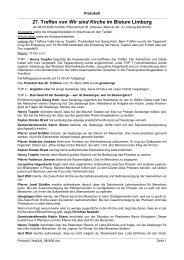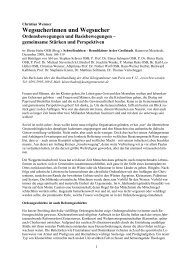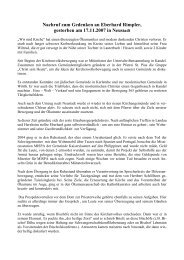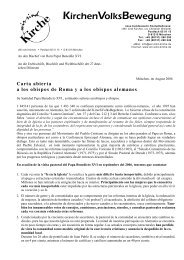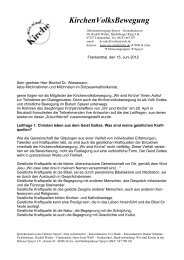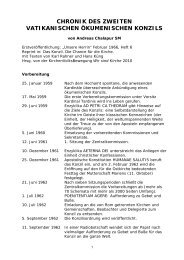APPENDIX - Wir sind Kirche
APPENDIX - Wir sind Kirche
APPENDIX - Wir sind Kirche
You also want an ePaper? Increase the reach of your titles
YUMPU automatically turns print PDFs into web optimized ePapers that Google loves.
<strong>APPENDIX</strong><br />
Individuals notified, silenced, excommunicated, or otherwise investigated and<br />
disciplined/censured by the Congregation for the Doctrine of the Faith, directly or indirectly<br />
Cardinal Joseph Ratzinger, Prefect (1979 - 2005)<br />
(in reverse chronological order)<br />
2005<br />
Fr. Thomas Reese, SJ—Under pressure from the<br />
CDF, the Jesuits removed Reese from his post as editor<br />
of America magazine for his insistence on presenting<br />
multiple points of view (and not only official church<br />
teaching) on such hot-button issues as HIV/AIDS,<br />
homosexuality, abortion/contraception, priestly celibacy<br />
and pluralism/ecumenism. A renowned scholar<br />
on church organization and politics, he has since gone<br />
on sabbatical at Santa Clara University.<br />
2004<br />
Fr Roger Haight, SJ—Was found to be in grave<br />
doctrinal error and banned from teaching Catholic<br />
theology. The CDF took issue with his take on Jesus’<br />
divinity, the Trinity and the meaning and value of<br />
Jesus’ death and resurrection, among other points.<br />
2002<br />
The Danube Seven—In late June, seven women<br />
were “illicitly and invalidly” ordained as priests, and<br />
were promptly excommunicated on the Feast of<br />
Mary Magdalene (July 22) when they did not repent<br />
as the CDF ordered.<br />
Fr. Willigis Jäger, OSB/Ko-un Roshi—This<br />
German Benedictine and Zen master was ordered to<br />
cease all public activity (teaching, writing and<br />
presenting). According to John L. Allen, Jr., of the<br />
National Catholic Reporter (March 1, 2002), “Jäger<br />
has been faulted for playing down the Christian<br />
concept of God as a person in his work as a spiritual<br />
guide, and for stressing mystical experience above<br />
doctrinal truths.” In other words, he questioned the<br />
relationship between spiritual experience and doctrinal<br />
claims.<br />
Fr. Josef Imbach, OFM Conv—Assigned a year of<br />
“reflection,” or suspension, while his 1995 book on<br />
miracles (in English translation, Miracles: A 21st<br />
Century Interpretation, 1988) was under review.<br />
Again, John L. Allen, Jr., writes in the NCR:<br />
“Imbach...was accused of not believing in the divinity<br />
of Jesus, of refusing the magisterium of the<br />
church, of describing the gospels as teaching texts<br />
rather than historically reliable accounts, and of<br />
excluding the possibility of miracles. He denied<br />
holding these views.”<br />
Fr. Thomas Aldworth, OFM—This Chicago<br />
theologian, author and pastor was censured for how<br />
he presented teachings on original sin and related<br />
points in two books he wrote for popular audiences,<br />
Shaping a Healthy Religion, Especially If You Are<br />
Catholic (1985) and Fashioning a Healthier Religion<br />
(1992).<br />
2001<br />
Fr. Paul Collins, MSC—Resigns from active priesthood<br />
following his investigation (details below,<br />
1998). He has continued speaking out on issues of<br />
sexual abuse and aspects of the papal office.<br />
Fr. Antonio Rosmini Serbati—The case involving<br />
this 19th-century priest, whose works were once on<br />
Catholics for a Free Choice: Moving Forward by Looking Back<br />
31<br />
Cardinal Joseph Ratzinger’s Preparation for the Papacy
the list of prohibited books, was reconsidered and<br />
partially rehabilitated.<br />
Fr. Marciano Vidal, CSSR—Vidal’s writings as<br />
investigated (see below, 1997) would be revised and<br />
include evidence of the notification, but would not<br />
be permitted for use in theological formation.<br />
Fr. Jacques Dupuis, SJ—Censured, but never officially<br />
disciplined, for his teachings on religious<br />
pluralism that (among other things and by<br />
Ratzinger’s reading) did not insist sufficiently on<br />
Jesus Christ’s unique capacity to save.<br />
Abp. Emmanuel Milingo—Long an unconventional<br />
healer and unofficial exorcist as well as a critic<br />
of what he perceived as the hierarchy’s “toleration”<br />
of homosexuality and lack of celibacy within the<br />
priesthood, he was threatened with excommunication<br />
for attempting marriage to Maria Sung through<br />
the Rev. Sun Myung Moon’s Unification Church<br />
and refusing the discipline of celibacy. He renounced<br />
the marriage.<br />
Fr. Gustavo Gutiérrez, OP—Seeking a haven from<br />
his conservative archbishop, Gutiérrez joined the<br />
Dominicans.<br />
Fr. Roger Haight, SJ—The CDF was not satisfied<br />
with the clarifications he offered as responses to<br />
their questions, so it began a full investigation of his<br />
work.<br />
2000<br />
Sr. Lavinia Byrne, IBVM—Under fire for her<br />
beliefs about contraception and, more significantly,<br />
the ordination of women to the priesthood, she<br />
refused to recant and was compelled to leave religious<br />
life.<br />
Prof. Dr. Reinhard Meßner (Innsbruck, Austria)—<br />
This historian of liturgy came under scrutiny for his<br />
writings (done while a graduate student) on the<br />
sacramental life of the church. The CDF issued a<br />
16-point censure, with the main points being that:<br />
1) thanks to the magisterium’s role in interpreting<br />
revelation, later (and present) church practice should<br />
not be evaluated based on early church experiences;<br />
2) Christ definitively instituted all seven sacraments,<br />
as well as apostolic succession; and 3) “there can be<br />
no contradiction between the declarations of church<br />
authorities and the practice of the church in liturgies.<br />
In other words, historical liturgical texts or data may<br />
not be regarded as authoritative when they conflict<br />
with church teaching.”<br />
Fr. Roger Haight, SJ—The CDF notified him of<br />
questions regarding his Christology and theological<br />
method as written in his 1999 book Jesus: The<br />
Symbol of God. He was suspended from his teaching<br />
post at Weston Jesuit School of Theology.<br />
1999<br />
Michael Stoeber—The board of trustees at the<br />
Catholic University of America denied tenure to<br />
this professor of Eastern religions in the Religion<br />
and Religious Education department despite unanimous<br />
approval by the Academic Senate. There was<br />
concern about some of his writings that compared<br />
Hindu reincarnation and Christian resurrection. The<br />
CDF became involved in the review, since all eight<br />
US cardinals and 16 other bishops are on the board;<br />
it was at one cardinal’s request that Stoeber’s work<br />
was scrutinized.<br />
Sr. Jeannine Gramick, SSND & Fr. Robert Nugent,<br />
SDS—The CDF finally sanctioned them for not<br />
adequately representing authentic church teaching<br />
about homosexuality. Their religious congregations<br />
did likewise, essentially prohibiting them from participating<br />
in public ministry to homosexuals. Nugent<br />
accepted the sanctions; Gramick, in conscience, left her<br />
order to join the Loretto Sisters in 2004.<br />
1998<br />
Perry Schmidt-Leukel—This lay theologian came<br />
under fire for his 1997 book Theology of Religions;<br />
he has since not been permitted to teach in German<br />
Catholic theology departments.<br />
Fr. Anthony de Mello, SJ—The renowned retreat<br />
master, spiritual director and psychotherapist was<br />
Catholics for a Free Choice: Moving Forward by Looking Back<br />
32<br />
Cardinal Joseph Ratzinger’s Preparation for the Papacy
censured posthumously (d. 1987) for not being<br />
Christocentric enough and, more generally, not<br />
hewing sufficiently closely to Catholic orthodoxy,<br />
i.e. being too open to readers and seekers who were<br />
not specifically Catholic or even religious.<br />
Fr. Jacques Dupuis, SJ—Investigated for suspected<br />
heresy in his 1998 book Toward a Christian Theology<br />
of Religious Pluralism.<br />
Sr. Lavinia Byrne, IBVM—Ratzinger directs Liturgical<br />
Press (owned and run by the Benedictine<br />
monks at St. John’s Abbey, Collegeville, Minnesota)<br />
to destroy all 1,300 remaining copies of Byrne’s<br />
book Woman at the Altar in stock.<br />
Fr. Paul Collins, MSC—This Australian priest,<br />
church historian, and broadcaster was investigated<br />
for his book Papal Power, and the CDF accused him<br />
of holding “an erroneous concept of papal infallibility,”<br />
as well as misunderstanding sensus fidelium to<br />
include only the laity and not the hierarchy as well.<br />
1997<br />
Fr. Tissa Balasuriya, OMI—This notification was a<br />
response to the escalation of complaints from the<br />
bishops’ conference of Sri Lanka against Balasuriya<br />
for his 1994 book Mary and Human Liberation. The<br />
bishops exhorted the faithful to avoid this text,<br />
which, they said, “contained statements incompatible<br />
with the faith of the Church regarding the<br />
doctrine of revelation and its transmission, Christology,<br />
soteriology and Mariology.” The final push was<br />
Balasuriya’s refusal to sign a prepared profession of<br />
faith; he argued that he was still within the bounds<br />
of orthodoxy. After prolonged censure and continued<br />
public outcry, he was reinstated in 1998.<br />
Fr. Marciano Vidal, CSsR—The CDF began its<br />
investigation of Vidal based on his body of work,<br />
with specific attention to a three-volume manual he<br />
wrote on morality. They took specific issue with his<br />
portrayal of the relationship between scripture,<br />
tradition, the magisterium and the theologian, as<br />
well as particular points on person, sexuality,<br />
bioethics, social morality, eschatology and utopia.<br />
1995<br />
Bp. Jacques Gaillot—He was removed from his<br />
post as bishop of Evreux, France, for unorthodox<br />
stances and conduct regarding poverty, homelessness<br />
and contraception. He was instead sent to lead<br />
the diocese of Partenia, a long-lost African diocese,<br />
and is doing so as a virtual diocese online<br />
(partenia.org).<br />
Mrs. Vassula Ryden—This Greek Orthodox<br />
woman claimed to see visions and bring messages<br />
directly from Jesus. The CDF warned the faithful of<br />
errors in her writings and speeches and claimed that<br />
these were products of her meditation rather than<br />
any divine or supernatural source.<br />
Ivone Gebara, SND—The CDF picked up where<br />
the Brazilian hierarchy left off (see below, 1993),<br />
reviewed her other writings, and pressured her order<br />
to discipline her. She was silenced for two years.<br />
Sr. Lavinia Byrne, IBVM—Bishop John Kinney<br />
(St. Cloud, Minnesota) reported to the CDF the US<br />
publication of Byrne’s 1994 book Woman at the<br />
Altar, which argued for women in the priesthood; by<br />
a stroke of timing, it was already in process at the<br />
UK publisher when John Paul II issued Ordinatio<br />
Sacerdotalis. She asked that the document be<br />
included as an addendum to her text. Pending<br />
further investigation, her superiors asked her to<br />
refrain from teaching or speaking publicly about<br />
women’s ordination.<br />
Sr. Carmel McEnroy, RSM—In 1994, McEnroy<br />
was one of hundreds who signed an open letter to<br />
John Paul II in response to Ordinatio Sacerdotalis,<br />
requesting further discussion on the issue of<br />
women’s ordination. The letter ran in the National<br />
Catholic Reporter and did not include her school<br />
affiliation. Nonetheless, she was fired for doing so,<br />
and without due process. (As with William Donn’s<br />
1987 case below, it is unclear what role the CDF<br />
may have played in this matter, or whether it is<br />
more appropriately local. Also, as with the silencing<br />
of Charles Curran and many others, this points up<br />
the raw tensions between academic/intellectual<br />
Catholics for a Free Choice: Moving Forward by Looking Back<br />
33<br />
Cardinal Joseph Ratzinger’s Preparation for the Papacy
freedom and the CDF’s expectations that theologians<br />
should present—and assent to—church teaching<br />
without ever engaging it critically.)<br />
1993<br />
Ivone Gebara, SND—The Brazilian nun was investigated<br />
by her nation’s bishops for having publicly<br />
defended legal abortion. They resolved the matter<br />
by having her affirm her opposition to abortion.<br />
1992<br />
Fr. Eugen Drewermann—This priest and Jungian<br />
psychotherapist was criticized for exegeting biblical<br />
texts with psychoanalytic criteria in mind (see<br />
his 1988 book Tiefenpsychologie und Exegese), as<br />
well as for his views on resurrection and the virgin<br />
birth. In 1991 his archbishop denied him the right<br />
to preach or teach and began proceedings against<br />
him.<br />
Fr. André Guindon, OMI—Investigations began<br />
into his 1986 book, The Sexual Creators, specifically<br />
for his views on homosexuality, premarital sex and<br />
birth control.<br />
1991<br />
Fr. Leonardo Boff, OFM—Boff was nearly silenced<br />
again, so that he would not attend and speak out at<br />
the Earth Summit (Rio de Janeiro, 1992). The<br />
following year, he “promoted himself to the state of<br />
laity” and left the Franciscans and eventually the<br />
priesthood.<br />
1990s<br />
The Society of Jesus—Gerald Renner of the<br />
National Catholic Reporter (August 11, 2000) notes:<br />
“Several American Jesuits have been targeted by<br />
Vatican crackdowns in recent years. Specifically, the<br />
Vatican has refused to approve at least five US<br />
Jesuits to serve as administrators or members of<br />
pontifical faculties at Weston School of Theology,<br />
Cambridge, Mass., or Jesuit School of Theology,<br />
Berkeley, Calif. The Jesuits include: Frs. William J.<br />
Rewak, Edward Glynn, Michael Buckley, David<br />
Hollenbach and John Baldovin.”<br />
1988<br />
Fr. Gustavo Gutiérrez— The CDF attempts yet<br />
another investigation of Gutiérrez.<br />
Abp. Marcel Lefebvre—This staunch opponent of<br />
Vatican II reforms (such as ecumenism and the Mass<br />
in vernacular rather than Latin), who founded the<br />
Society of St. Pius X, was excommunicated for<br />
consecrating four bishops despite warnings from<br />
John Paul II, thus risking schism and jeopardizing<br />
apostolic succession.<br />
Sr. Jeannine Gramick, SSND & Fr. Robert<br />
Nugent, SDS—Investigations renewed.<br />
1987<br />
Dr. John McNeill, SJ—In 1986 he disobeyed his<br />
1977 orders demanding silence about homosexuality,<br />
thus compelling the Jesuits to expel him formally.<br />
The expulsion became effective in 1987, and he has<br />
since worked as a psychotherapist in private practice<br />
and remains active in DignityUSA.<br />
Fr. William Donn—Was similarly forced to resign<br />
from the Newman Center at St. Cloud State University<br />
in Minnesota for disagreeing with the Church’s<br />
teachings on homosexuality. (It is unclear what role<br />
the CDF may have played in this matter, or whether<br />
it is more appropriately local.)<br />
Abp. Raymond G. Hunthausen (Seattle archdiocese)—After<br />
much protest from the archdiocese and<br />
fellow bishops, the Vatican reinstates Hunthausen’s<br />
authority and exchanges the auxiliary bishop for a<br />
coadjustor instead.<br />
1986<br />
Fr. Charles Curran—Formerly a professor of<br />
moral theology at Catholic University of America,<br />
he had his license to teach Catholic theology<br />
revoked because of his challenges to Humanae Vitae<br />
and related stances on contraception and medical<br />
ethics. The underlying reason, though, was his insistence<br />
on his right to challenge (and dissent from)<br />
noninfallible teachings. CUA formally dismissed<br />
Catholics for a Free Choice: Moving Forward by Looking Back<br />
34<br />
Cardinal Joseph Ratzinger’s Preparation for the Papacy
Curran the following year. He presently teaches in<br />
the Religious Studies Department at Southern<br />
Methodist University.<br />
ordered all signatories to recant and withdraw<br />
support for the ad. Ferraro and Hussey refused and<br />
finally left their order in 1988.<br />
Fr. Gustavo Gutiérrez—The CDF issues yet<br />
another instruction against certain aspects of liberation<br />
theology.<br />
Fr. Gustavo Gutiérrez—The CDF issues an<br />
instruction against certain aspects of liberation<br />
theology.<br />
Fr. Edward Schillebeeckx, OP—Investigated for his<br />
1985 book The Church with a Human Face.<br />
Fr. György Bulányi, SP—This Hungarian priest<br />
and founder of the base Christian community movement<br />
was accused of heresy for encouraging the<br />
growing conscientious objector movement against<br />
compulsory military service. In 1981, the Hungarian<br />
bishops condemned his writings, forbade him to<br />
practice as a priest and forwarded his case to the<br />
CDF, which excommunicated him. He was officially<br />
rehabilitated in 1998.<br />
1985<br />
Fr. Leonardo Boff, OFM—The renowned Brazilian<br />
human rights advocate, liberation theologian and<br />
suspected Marxist was silenced (forbidden to teach,<br />
speak or write and suspended from religious duties)<br />
for his liberation theology book Church: Charism<br />
and Power. The CDF’s concerns lay in the areas of<br />
church structure, dogmas and revelation, the exercise<br />
of sacred power and the role of the laity. International<br />
pressure led to the silencing being lifted one<br />
year later.<br />
Abp. Raymond G. Hunthausen (Seattle archdiocese)—As<br />
a result of Abp Hickey’s report (see below,<br />
1983), the Vatican appoints an auxiliary bishop to<br />
Seattle and transfers much of Hunthausen’s power to<br />
his subordinate.<br />
1984<br />
Sr. Barbara Ferraro, SNDdeN & Sr Patricia<br />
Hussey, SNDdeN—They were among a group of 91<br />
priests and nuns who had signed a full-page ad in the<br />
New York Times that noted the diversity of opinions<br />
about abortion among Catholics. The Vatican<br />
Fr. Edward Schillebeeckx, OP—Investigated for his<br />
1980 book The Ministry in the Church, in which he<br />
espoused the “Protestant” notion that a Christian<br />
community should have some say in choosing its<br />
ministers.<br />
Sr. Jeannine Gramick, SSND & Fr Robert<br />
Nugent, SDS—Investigations begin into their<br />
ministry (New Ways Ministry) to homosexuals.<br />
1983<br />
Sr. Mary Agnes Mansour, RSM—She was the director<br />
of Michigan’s Department of Social Services,<br />
where her job included administering Medicaid<br />
funds for abortions. She had taken the job with her<br />
bishop’s permission, yet this was deemed to conflict<br />
with her role as a nun. According to the Sisters of<br />
Mercy, “she said that while she personally abhorred<br />
abortion, as long as it was legal it would be unfair to<br />
permit it only for women who had the means to<br />
afford it.” A papal emissary delivered an ultimatum:<br />
leave her DSS post or leave her order. She reluctantly<br />
chose the latter. A lifelong educator and social<br />
reformer, she was inducted into the Michigan<br />
Women’s Hall of Fame in 1988.<br />
Sr. Elizabeth Morancy, RSM & Sr. Arlene Violet,<br />
RSM—Both women were active in political life in<br />
Rhode Island, having been elected to office as state<br />
representative and attorney general respectively.<br />
Like Mansour above, each was presented with an<br />
ultimatum and chose to follow her ministerial vocations.<br />
Fr. Ernesto Cardenal—John Paul II scolded this<br />
liberation theologian, priest and poet (and four other<br />
priests) for serving in the Sandinista government.<br />
Catholics for a Free Choice: Moving Forward by Looking Back<br />
35<br />
Cardinal Joseph Ratzinger’s Preparation for the Papacy
The Vatican ordered them to quit those posts.<br />
Cardenal declined and consequently was denied the<br />
authority to serve as a priest. He continued as the<br />
minister of culture until 1988 and eventually left the<br />
Sandinista party in 1994, levying charges of corruption<br />
against the changing leadership.<br />
Fr. Gustavo Gutiérrez—The Vatican notified the<br />
Peruvian bishops of 10 suspect points in Gutiérrez’<br />
writing (on liberation theology) and demands that<br />
they condemn him. The bishops refused.<br />
Abp. Raymond G. Hunthausen (Seattle archdiocese)—Investigated<br />
following complaints of liturgical<br />
abuse and for his recognition of DignityUSA, an<br />
organization of GLBT Catholics. Abp James<br />
Hickey (Washington, DC) performed a visitation<br />
and review at the Vatican’s request.<br />
Cdl. Joseph Höffner—Archbishop of Cologne,<br />
investigated regarding the “Work of the Angels.”<br />
No further details available.<br />
Abbé Georges de Nantes—This archconservative<br />
French priest’s notoriously anti-Vatican II activities<br />
(since the opening of the council) earned him a<br />
suspension from his superior. Comparable to Marcel<br />
Lefebvre, he founded the League of the Catholic<br />
Counter-Reformation (CRC) and wrote “Books of<br />
Accusation” against Paul VI, John Paul II and the<br />
author of the 1993 Catechism.<br />
Abp. Pierre Martin Ngo Dinh Thuc—Excommunicated<br />
for consecrating (from 1976 onward) many<br />
bishops without papal approval, thus fostering<br />
splinter groups, courting schism and risking apostolic<br />
succession.<br />
Fr. Matthew Fox, OP—This Dominican theologian<br />
taught what he called “creation spirituality,”<br />
which, critics argued, “contaminated” Catholic<br />
teachings and practices with New Age sensibilities.<br />
For “advocating panentheism,” and additionally for<br />
his views on sexuality and original sin, he was<br />
censured and forbidden to teach. He was dismissed<br />
from the Dominicans in 1993 for refusing to return<br />
home to the Midwest and received as an Episcopal<br />
priest in 1994.<br />
1982<br />
Bp. Alan C. Clark—This bishop of East Anglia was<br />
co-chair of the Anglican Roman Catholic International<br />
Commission (ARCIC), a group working<br />
toward theological rapprochement between the two<br />
churches. He was investigated concerning ambiguities<br />
and points of theological conflict—real presence<br />
in the Eucharist, apostolic succession, interpretation<br />
of scripture and women’s ordination—in a report he<br />
wrote on the commission’s behalf.<br />
Fr. Anthony Kosnik (Detroit archdiocese)—<br />
Following the investigation for the Human Sexuality<br />
study, Kosnik was pressured to leave his faculty<br />
post at SS. Cyril & Methodius Seminary. The<br />
school rallied successfully to get him reinstated,<br />
but he was eventually forced to resign altogether<br />
the following year.<br />
1980s<br />
The Society of Jesus—In a New Yorker article<br />
(May 2, 2005), Jane Kramer argues that Jesuits were<br />
systematically targeted because their commitments<br />
and activities (e.g. liberation theology) were out of<br />
step with the ascendant priorities and values of the<br />
Vatican in John Paul II’s papacy. She wrote: “During<br />
[Ratzinger’s] first ten years as Prefect [of the<br />
Congregation for the Doctrine of the Faith], the<br />
Jesuits were censured for challenging papal teachings<br />
on contraception, parts of their constitution were<br />
suspended, and their Vicar General, Vincent<br />
O’Keefe, a passionate advocate for social justice, was<br />
removed.” (39) She does not make O’Keefe’s particular<br />
role clear.<br />
Dates unspecified<br />
Fr. Karl Rahner—One of the 20th century’s theological<br />
giants, Rahner was often in the Vatican’s<br />
eye—silenced under John XXIII, rehabilitated<br />
Catholics for a Free Choice: Moving Forward by Looking Back<br />
36<br />
Cardinal Joseph Ratzinger’s Preparation for the Papacy
under Paul VI, peritus for the German bishops at<br />
Vatican II, and then back under scrutiny during John<br />
Paul II’s reign. The issues of greatest concern for the<br />
CDF from his corpus include priestly ordination,<br />
contraception and his classic notion of “the anonymous<br />
Christian.” After his death (1984) and by the<br />
time of his centenary (2004), the CDF had come<br />
around to declare him orthodox at last.<br />
Bp. Dom Pedro Casaldáliga (Sao Félix, Brazil)—<br />
This liberation theologian was criticized on many<br />
occasions for his political engagement beyond the<br />
borders of his own diocese.<br />
Fr. August Bernhard Hasler—This priest, historian<br />
and former staffer of the Vatican’s Secretariat for<br />
Christian Unity published his 1979 book How the<br />
Pope Became Infallible, a study of Pius XII’s push<br />
for this power. Under fire like Küng before him, he<br />
eventually left the priesthood.<br />
“Six Claretian priests from Madrid” were noted in<br />
an NCR article by Dawn Gibeau (“Today’s sinners<br />
in eyes of the Vatican may very well be tomorrow’s<br />
saints,” February 3, 1995), but no further details on<br />
dates or the reason for their being investigated were<br />
mentioned.<br />
Tübingen faculty, teaching ecumenical theology<br />
instead.<br />
Fr. Edward Schillebeeckx, OP—The CDF began<br />
investigating him for his Christology, but bowed to<br />
international pressure the following year to end the<br />
drive for a trial. Schillebeeckx has since continued to<br />
write pieces that purportedly conflict with church<br />
teaching, and he receives notifications regularly.<br />
Fr. Anthony Kosnik (Detroit archdiocese)—Came<br />
under fire for his theology in Human Sexuality, a<br />
study he co-authored on behalf of the Catholic<br />
Theological Society. The Vatican disliked the study’s<br />
theology and Kosnik was pressured to resign in 1982<br />
from Ss. Cyril and Methodius Seminary. Seminarians<br />
and faculty threatened to boycott the school’s spring<br />
commencement if Kosnik was not reinstated. He got<br />
his job back, but was forced to resign the next year.<br />
Fr. Jacques Pohier, OP—For his teachings on the<br />
resurrection, he has the distinction of being the first<br />
theologian John Paul II disciplined as pope. Then<br />
the dean of theology faculty at a French Dominican<br />
theological school, he could no longer teach theology,<br />
say Mass or participate in liturgies. He left the<br />
Dominicans six years later.<br />
Msgr. Luigi Sartori—The former president of the<br />
Italian Theological Association and consultant to<br />
the Secretariat for Non-Christians was denounced<br />
to the CDF by the Padua branch of Communion<br />
and Liberation, and as a result his teaching privileges<br />
at the Lateran University were severely<br />
restricted.<br />
• • •<br />
Other noteworthy investigations and<br />
censures leading into Ratzinger’s tenure:<br />
1979<br />
Fr. Hans Küng—His license to teach Catholic<br />
theology was revoked, but he remained on the<br />
Fr. Charles Curran—Investigations begin.<br />
1977<br />
Dr. John McNeill, SJ—He was silenced and forbidden<br />
to discuss homosexuality or minister to homosexuals.<br />
1975<br />
Fr. Hans Küng—While Ratzinger was archbishop<br />
of Munich, investigations began regarding his views<br />
on papal infallibility.<br />
Fr. Bernard Häring (German Redemptorist)—<br />
Originally in the Vatican’s good graces, especially<br />
under John XXIII, he was publicly critical of<br />
Humanae Vitae upon its release (1968) and not long<br />
Catholics for a Free Choice: Moving Forward by Looking Back<br />
37<br />
Cardinal Joseph Ratzinger’s Preparation for the Papacy
afterward became the subject of investigation by the<br />
CDF. He was equally critical of John Paul II’s Veritatis<br />
Splendor. The charges against him were never<br />
entirely resolved before his death in 1998.<br />
1974<br />
Dr. John McNeill, SJ—Investigations on McNeill<br />
for his views on homosexuality began.<br />
1968<br />
Fr. Edward Schillebeeckx, OP—Dared to question<br />
Mary’s virginity. Karl Rahner and the Dutch church<br />
successfully defended him.<br />
1967<br />
Abp. Clarence G Isenmann—Details of investigation<br />
unavailable/unclear.<br />
Catholics for a Free Choice: Moving Forward by Looking Back<br />
38<br />
Cardinal Joseph Ratzinger’s Preparation for the Papacy


